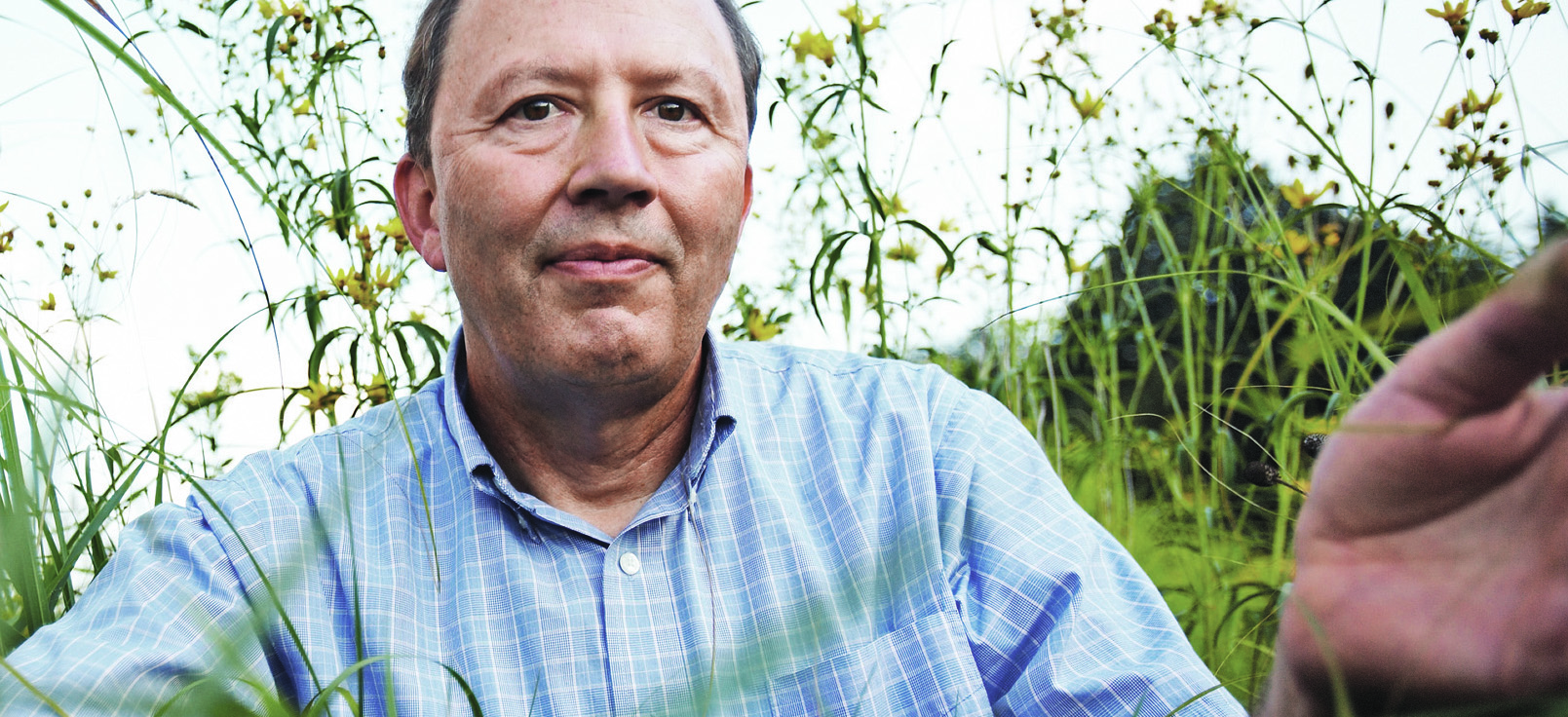
DAVID TILMAN is Regents' Professor and McKnight Presidential Chair in Ecology at the University of Minnesota, where he also serves as Director of the Cedar Creek Ecosystem Science Reserve. He is best known for his experimental and theoretical work on competition and on the mechanistic causes of multispecies coexistence, and for demonstrating via rigorous field experiments and theory that biodiversity is of central importance to the functioning of ecosystems.
In the 1970’s, Tilman proposed and experimentally tested the first mechanistic and predictive theory in ecology, which he called resource competition theory. His classic 1982 Princeton Monograph expanded on this theory and showed its application to organisms ranging from bacteria and algae to grasses and trees, and to terrestrial, freshwater and marine ecosystems. By then explicitly incorporating interspecific tradeoffs into this theory, he has more recently explored the forces that may have led to the emergence and coexistence of the earth’s biodiversity, the effects of the loss of biodiversity on ecosystem stability and functioning, and the impacts of global agriculture on ecosystem services and global biodiversity.
His long-term ecological experiments at Cedar Creek Ecosystem Science Reserve focus on the impacts on ecosystems of human-induced environmental changes, including the loss of biodiversity, nitrogen deposition, habitat destruction and climate change. A major goal of his current research is the pursuit of ways to preserve the world’s biodiversity, slow the rate of climate change and still meet human needs for food and energy.
Tilman received his Ph. D. in Zoology from the University of Michigan in 1976. In addition to being on the faculty at the University of Minnesota, Tilman holds an appointment as Professor in the Bren School of Environmental Science and Management at the University of California Santa Barbara. He is a member of the US National Academy of Sciences and the American Academy of Arts and Sciences. He was awarded the International Prize for Biology in 2008 and the Heineken Prize for Environmental Sciences in 2010. He has received the Cooper and MacArthur Awards from the Ecological Society of America, the Centennial Award from the Botanical Society of America, the Princeton Environmental Prize, the Alexander von Humboldt Medal, a Guggenheim Fellowship, and was named an Honorary Member or Fellow of both the British Ecological Society and the Ecological Society of America. He has written two books, edited three more, and published more than 250 scientific papers. For the 1991-2000 and the 2001-2010 decades, David Tilman was ranked as the world’s most highly cited environmental scientist by the Web of Science.
CONTACT
tilman@umn.edu
612-625-5740
CV
SELECTED PUBLICATIONS
Tilman, D., P.B. Reich and F. Isbell. 2012. Biodiversity impacts ecosystem productivity as much as resource disturbance or herbivory. Proceedings of the National Academy of Sciences 109: 10394-10397.
Tilman, D. 2011. Diversification, biotic interchange and the Universal Tradeoff Hypothesis. The American Naturalist 178: 355-371.
Fargione, J., J. Hill, D. Tilman, S. Polasky and P. Hawthorne. 2008. Land clearing and the biofuel carbon debt. Science 319: 1235-1238.
Tilman, D., P. B. Reich and J. M. H. Knops. 2006. Biodiversity and ecosystem stability in a decade-long grassland experiment. Nature 441:629-632.
Tilman, D. 2004. Niche tradeoffs, neutrality, and community structure: A stochastic theory of resource competition, invasion, and community assembly. Proceedings of the National Academy of Sciences 101:10854-10861.
Tilman, D., K. G. Cassman, P. A. Matson, R. Naylor and S. Polasky. 2002. Agricultural sustainability and intensive production practices. Nature 418:671-677.
Tilman, D., P. B. Reich, J. Knops, D. Wedin, T. Mielke and C. Lehman. 2001. Diversity and productivity in a long-term grassland experiment. Science 294:843-845.
Lehman, C. L. and D. Tilman. 2000. Biodiversity, stability, and productivity in competitive communities. The American Naturalist 156:534-552.
Tilman, D. 2000. Causes, consequences and ethics of biodiversity. Nature 405:208-211.
Tilman, D. 1999. The ecological consequences of changes in biodiversity: a search for general principles. The Robert H. MacArthur Award Lecture. Ecology 80:1455-1474.
Tilman, D., J. Knops, D. Wedin, P. Reich, M. Ritchie and E. Siemann. 1997. The influence of functional diversity and composition on ecosystem processes. Science 277:1300-1302.
Tilman, D., C. L. Lehman and K. T. Thomson. 1997. Plant diversity and ecosystem productivity: Theoretical considerations. Proceedings of the National Academy of Sciences 94:1857-1861.
Tilman, D. 1997. Community invasibility, recruitment limitation, and grassland biodiversity. Ecology 78:81-92.
Tilman, D., D. Wedin and J. Knops. 1996. Productivity and sustainability influenced by biodiversity in grassland ecosystems. Nature 379:718-720.
Tilman, D., R.M. May, C.L. Lehman, and M.A. Nowak. 1994. Habitat destruction and the extinction debt. Nature 371:65-66.
Tilman, D. and J.A. Downing. 1994. Biodiversity and stability in grasslands. Nature 367:363-365.
Tilman, D. 1994. Competition and biodiversity in spatially structured habitats. Ecology 75:2-16.
Tilman, D. (1988) Plant Strategies and the Dynamics and Structure of Plant Communities. Princeton University Press. 360 pp.
Tilman, D. (1982) Resource Competition and Community Structure. Princeton University Press. 296 pp.
Tilman, D. 1977. Resource competition between planktonic algae: An experimental and theoretical approach. Ecology 58:338‑348.